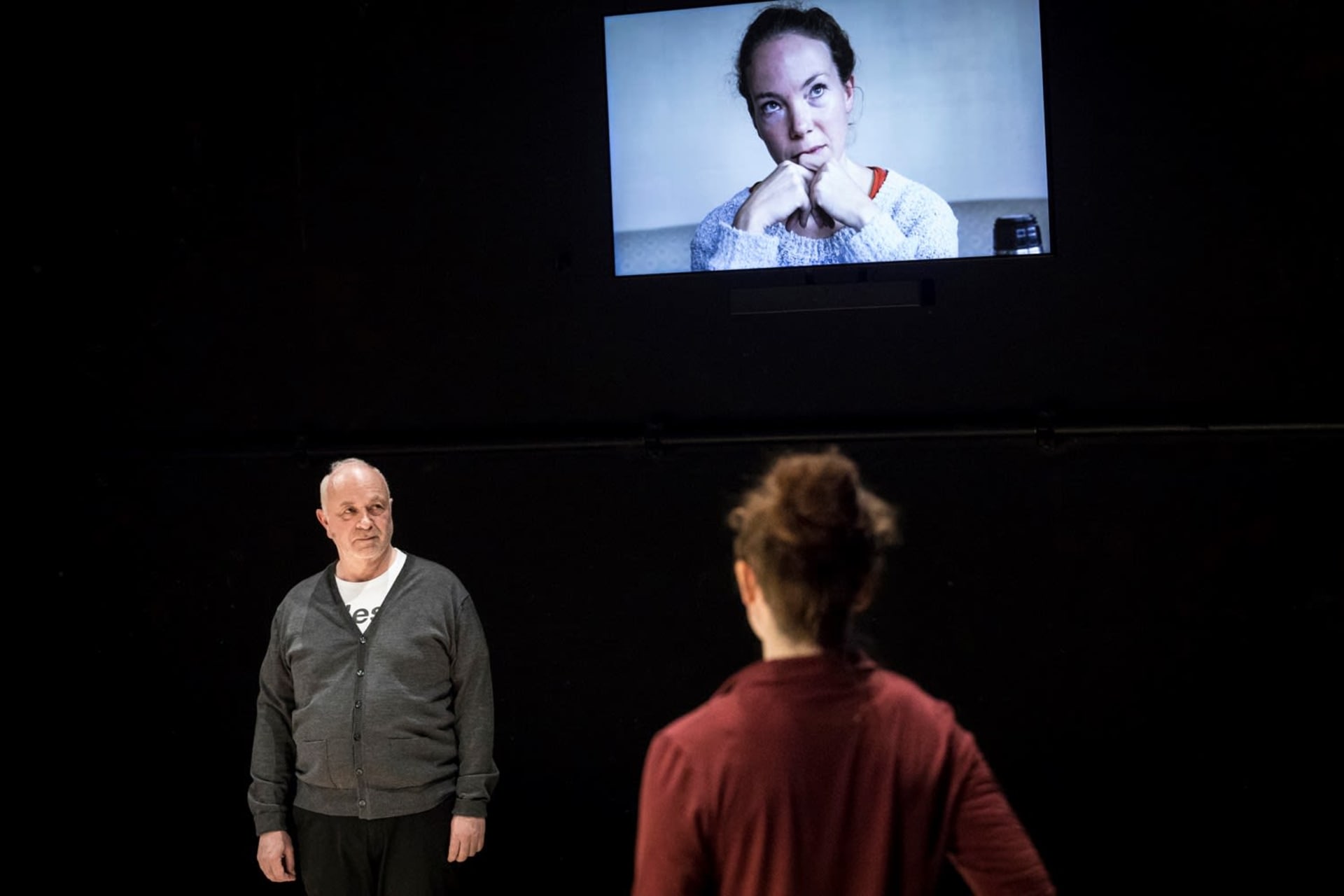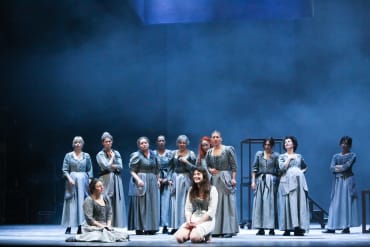Kolektiv Zirlib, Orléans, Francuska, France
TO JE ŽIVOT That's Life
Dokumentarni performans / Documentary performance
Sudjeluju / performed by Fanny Catel i Daniel Kenigsberg
Tekst i umjetnička koncepcija / Text and production by Mohamed El Khatib
Režija / Created by Fred Hocké, Mohamed El Khatib
Oblikovanje zvuka / Sound design Nicolas Jorio T
ehničko vodstvo / Technical management Madeleine Campa
Umjetnička suradnja / Artistic collaboration Alan Clavier
Pishogenealogija / Psychogenealogy Bruno Clavier
Produkcija Kolektiv Zirlib
Kolektiv Zirlib financiraju Centre-Val de Loire Region, Ministarstvo kulture - DRAC Centre –Regije Loire i Grad Orléans / Zirlib company is funded by the Centre -Val de Loire Region, the Ministry of Culture - DRAC Centre -Val de Loire and the city of Orléans.
O predstavi
Smrt je, kako je rečeno milijun puta, zajedno s ljubavlju, središnja tema svega ljudskoga umjetničkog stvaralaštva. Ako vam suprug umre, postajete udovica ili udovac. Ako vam roditelji umru, postajete siroče. Za takvo što postoje riječi. Ali, ako vam dijete umre? I dalje mislimo kako je neprirodno da dijete umre prije svojih roditelja, ali i to se događa stalno i tek trebamo izmisliti termin za ovo stanje.
U svojem prethodnom radu Finir en beauté / Skončati u ljepoti, El Khatib je rekonstruirao majčinu smrt, dok se u predstavi C'est la vie /To je život okrenuo temi smrti sinova i kćeri. Počeo je prikupljati svjedočanstva ljudi koji su izgubili dijete, od Victora Hugoa do Zidanea, i ubrzo je susreo dva glumca, s kojima je dulje vrijeme želio raditi; Fanny Catel i Danielom Kenigsbergom. Daniel ima 61 godinu, visok je i krupan, glumac na kraju karijere. Njegov sin je počinio samoubojstvo u dobi od 25 godina. Fanny ima 37 godina, sitna je i mršava, a kćer je izgubila kad joj je bilo samo 5 godina.
Predložio im je neka mi govore kroz što prolaze i tako je ovaj granični eksperiment i započeo. Poslije mnogih sati razgovora, svjedočenja, epošte i administrativnih dokumenata, nastala je kronika o dvije smrti. Fanny i Daniel oči u oči, pred više od 100 gledatelja doživljavaju svoje priče, pružajući intimno, vizualno i političko iskustvo.
ABOUT PERFORMANCE
Death, as they’ve told us a million times, is the central topic, along with
love, of all human artistic creation. If your spouse dies, you become a widow
or widower. If your parents die, you become an orphan. There are words. But
if your child dies? We continue to think that it is unnatural for a child to die
before his or her parents, but it happens constantly and we have yet to invent
a term for this condition. In his previous work, Finir en beauté, he reconstructed
his mother’s death, and now he turns to speaking of the death of sons and daughters.
El Khatib had started off gathering testimonies from people who had lost a
child, from Victor Hugo to Zidane, and he soon came across two actors he
had wanted to work with before, although it had never happened: Fanny
Catel and Daniel Kenigsberg. Daniel, 61 years old and a tall and corpulent
actor, at the end of his career. His son committed suicide when he was 25.
Fanny, 37 years old, petite and thin, lost a daughter who was only 5 years
old. He suggested that they tell him what they were going through, which is how
this borderline experiment all started. After hours of interviews, testimonies,
emails and administrative documents, we developed the chronicle of two
deaths foretold. Fanny and Daniel face-to-face naked on stage, where no
more than 100 viewers will experience their tales with the greatest proximity
to the actors possible. An intimate, visual and political experience.
Bilješka autora
Uvijek sam smatrao da za bavljenje nekim problemom nije od vitalne važnosti prodrijeti u vlastitu intimu. Takav postupak stvara boljega svjedoka, ali ne i točnijega pripovjedača. Pa, ipak, tijekom nekoliko posljednjih godina, nisam u stanju odvojiti moje pisanje od realiteta. Nisam osobno iskusio gubitak djeteta, pa se ovaj tekst sastoji od gomilanja svjedočanstava ljudi koji su izgubili svoje dijete. Nakon što sam pisao o smrti moje majke, razmišljao sam o svojem tekstu Skončati u ljepoti, u kojemu sam govorio o onome što se obično naziva komotnost žalovanja.
U siječnju 2014. sam saznao da je Daniel Kenigsberg izgubio svojeg sina od 25 godina. Istodobno je Fanny Catel izgubila svoju djevojčicu od 5 godina. Predložio sam neka mi govore o tome kako se osjećaju. To je bio početak ovoga iskustva. Za mene oni više nisu bili glumci, nego osobe s nekom novom kvalitetom, ljudi koji su doživjeli ONO PRIJE i ONO POSLIJE. (Mohamed El Khatib)
Director's note
I always considered that is not vital to penetrate your own intimacy in dealing with some problem. Such an action creates a better witness, but not more an accurate narrator. Yet, over the last few years, I have not been able to separate my writing from reality. I have not personally experienced the loss of a child, so this text consists of the accumulation of testimonies of people who have lost their child.
In January 2014, I learned that Daniel Kenigsberg lost his 25 year old son. At the same time Fanny Catel lost her five year old daughter. I suggested they to tell me how they feel. That was the beginning of this experience.
For me, they were no longer actors, but people with a new qualitiy, people who experienced SOMETHING BEFORE AND SOMETHING AFTER. (Mohamed El Khatib)
Mohamed El Khatib je izvođač, autor, kazališni i fimski redatelj. Godine 2008. suosnivao je Kolektiv Zirlib, vodeći se premisom kako estetika nije lišena političkoga smisla.Mohamed El Khatib is a performer, author, stage director and filmmaker. In 2008, he cofounded the Collectif Zirlib under the following premise : aesthetics are not deprived of political meaning.
PRESS
Mohamed El Khatib je iza vrata dokumentarizma i terapije otvorio prostor za razmišljanje o tome što je teatar, poetizirajući ono što je glumcima blisko: igra i bol. Pitanje je može li se igrati/glumiti vlastita patnja? (Liberation, Paris)
U predstavi To je život, dokumentarna fikcija je obogaćena svim mogućim kazališnim sredstvima koja prate i pomažu glumcima Fanny Catel i Danielu Kenigsbergu u običnom životu, roditeljima koji nose jednaku bol za koju se traži riječ, da se suoče s osobnim gubitkom. (Les Inrocks, Paris)
Mohamed El Khatib opened a space behind the doors of documentary and therapy for thinking about what is a theatre, poetizing something close to the actors: play and pain. It is a question whether one can act/ perform his own suffering. (Liberation, Paris)
In the performance That's Life, a documentary fiction is enriched with all imaginable theatre devices helping two actors Fanny Catel and Daniel Kenigsberg in their ordinary lives, as well as to the parents with the same pain, a pain that searches for words in trying to confront their personale loss. (Les Inrocks, Paris)













